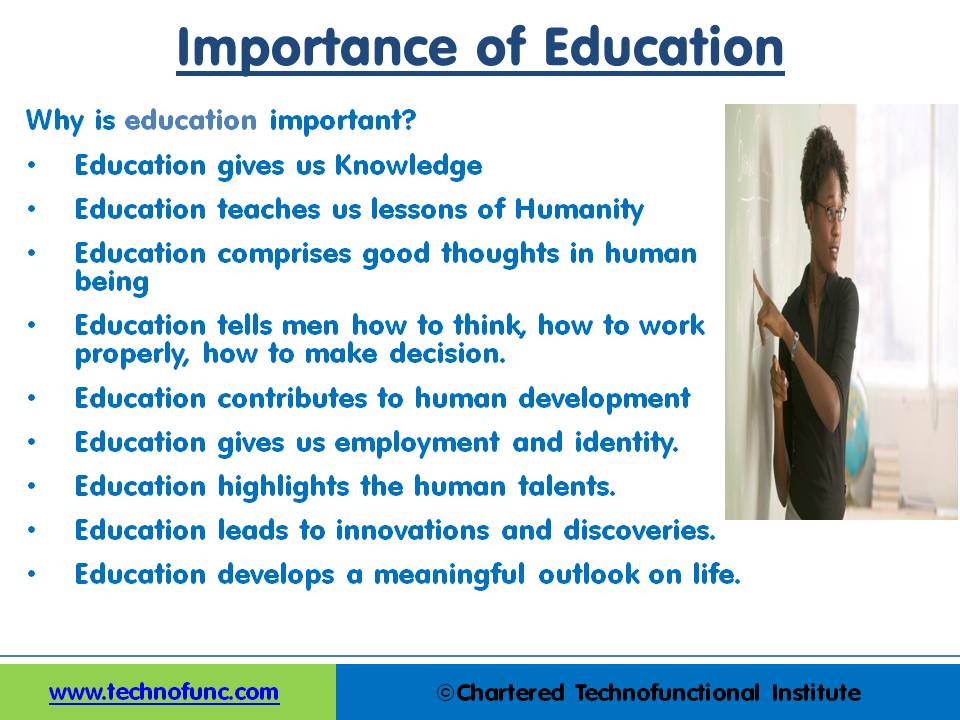- Home
- Business Processes
- Industry Knowledge
- Aerospace Industry
- Automotive Industry
- Banking Domain
- BFSI Industry
- Consumer/ FMCG Industry
- Chemicals Industry
- Engineering & Construction
- Energy Industry
- Education Domain
- Finance Domain
- Hospitality Domain
- Healthcare Industry
- Insurance Domain
- Retail Industry
- Travel and Tourism Domain
- Telecom Industry
- Leadership Skills
- eLearning
- Home
- Industry Knowledge
- Education Domain
- Importance of Education Industry
Importance of Education Industry
Nelson Mandela has said, “Education is the most powerful weapon which you can use to change the world.” The following article touches on some aspects that highlight the importance of education industry for human society.
Education is a Fundamental Right
Education is a fundamental human right and essential for the exercise of all other human rights. It promotes individual freedom and empowerment and yields important development benefits.
The right of access to higher education is mentioned in a number of international human rights instruments. The UN International Covenant on Economic, Social and Cultural Rights of 1966 declares, in Article 13, that "higher education shall be made equally accessible to all, on the basis of capacity, by every appropriate means, and in particular by the progressive introduction of free education". In Europe, Article 2 of the First Protocol to the European Convention on Human Rights, adopted in 1950, obligates all signatory parties to guarantee the right to education.
Normative instruments of the United Nations and UNESCO lay down international legal obligations for the right to education. These instruments promote and develop the right of every person to enjoy access to education of good quality, without discrimination or exclusion. These instruments bear witness to the great importance that the Member States and the international community attach to normative action for realizing the right to education. It is for governments to fulfill their obligations both legal and political in regard to providing education for all of the good quality and to implement and monitor more effective education strategies.
Tool for Development:
Education is a powerful tool by which economically and socially marginalized adults and children can lift themselves out of poverty and participate fully as citizens. No human beings are able to survive properly without education. By the means of education, only one’s potential can be used to the maximum extent. It tells us how to think, how to work properly, and how to make decisions. It gives us knowledge and teaches us the lessons of humanity. It nurtures good thoughts in human beings.
Schooling and Human Development:
It is commonly presumed that formal schooling is one of several important contributors to the skills of an individual and to human capital. Schools have a special place, not only because education and ‘skill creation’ are among their prime explicit objectives, but also because they are the factor most directly affected by public policies. It is well established that the distribution of personal incomes in society is strongly related to the amount of education people have had. Generally speaking, more schooling means higher lifetime incomes. These outcomes emerge over the long term. It is not people’s income while in school that is affected, nor their income in their first job, but their income over the course of their working life.
However, the application of education in different situations varies as per the basic mindset and intelligence levels of different people. Education is a productive and beneficial factor in a person’s life. The training of a human mind is not complete without education. Education opens up different opportunities for human beings in terms of employment, social standing, and mental uplift. By means of education, only one’s potential can be used to the maximum extent. It leads to various innovations and discoveries.

Impact on Economic Growth:
The relationship between the literate labor force and economic growth is perhaps even more important than the impact of human capital and school quality on individual productivity and incomes. Economic growth determines how much improvement can occur in the overall standard of living in a society. Moreover, the education of each individual has the possibility of making others better off (in addition to the individual benefits). A more educated society may translate into higher rates of innovation, higher overall productivity through firms’ ability to introduce new and better production methods, and faster introduction of new technology. These externalities provide an extra reason for being concerned about the quality of schooling.
Non-Cognitive Skills:
There is a whole set of non-cognitive skills that are important for success in economic life. It has become increasingly clear that society rewards non-cognitive skills such as honesty, reliability, determination, and personal efficacy. Early research found that personality and behavioral traits such as perseverance and leadership qualities had a significant influence on labor market success, including earnings. Individual differences in personality account for substantial differences in earnings. Quality of education has an influence upon the speed with which societies can become richer and the extent to which individuals can improve their own productivity and incomes.
Technical and Vocational Education:
Technical and vocational educations provide an introduction to technology and to the world of work within the context of general education. It helps learners acquire and develop know-how needed for a skilled occupation and is essential for occupational mobility, improvement of professional qualifications, and updating of knowledge, skills, and understanding. Technical and vocational education programs impart the technical requirements of the occupational sectors concerned and also provide the general education necessary for the personal and cultural development of the individual and include, inter alia, social, economic, and environmental concepts relevant to the occupation concerned. Clubbing of both the theoretical and practical aspects of the technical field in question, by way of training or by way of occupational experience in employment helps the learner gain the practical experience necessary to successfully accomplish the profession or occupation. Technical and vocational education prepares individuals to engage in meaningful professions to earn their livelihood.
Education is the bedrock of social and economic development; overall Education develops a meaningful outlook on life. Many living in urban poverty or in remote rural communities and young women, in particular, are unemployed or working for low pay. They need to be given a second chance to achieve their potential by exposing them to real education. Putting education to work can give young people a better start in life so that they can greet the world of work with confidence.
Related Links
You May Also Like
-
Importance of Education Industry
Nelson Mandela has said, “Education is the most powerful weapon which you can use to change the world.” The following article touches on some aspects that highlight the importance of education industry for human society.
-
How to Improve Education System
The education industry today is faced with many challenges, and in order to improve the education system and the performance and development of the education industry, the major improvement must be made in the sector. This article discusses the major components that need to be worked upon to create an effective improvement strategy.
-
The education industry is divided up into four sectors, which all have their own roles and functions. Each of the sectors caters to a growing demand for cutting-edge education products and services. Each category has distinct market segments, all of which are defined in this article below. For learners to understand the dynamics of the education industry, having a clear picture of the industry is crucial. This understanding will help in researching education companies, determining a career path, and even exploring potential employers.
-
Challenges in Education System
The Education sector underwent some major changes over the past five years. Enrolment in private schools outpaced government school enrolment for much of the period. Tutoring businesses and universities have offered new services to expand their market base. Online education is a major development for the Education Division, and technology is permeating all areas of education. Understand some of the major challenges that are faced by the education sector today.
-
What drives the Education Industry
In the section, we will discuss the drivers of the education industry. Business drivers are influences, both internal and external, that significantly impact the direction of an industry. This will help the learner understand the internal and external factors that have a significant influence on the education industry.
-
The education industry is expanding rapidly and its many businesses are eager for new talent, including experienced professionals and enthusiastic individuals just entering the workforce. The education industry can be described as the collection of organizations and businesses that provide products and services aimed at enhancing the quality of education in society. Read more to gain a complete overview of the education industry.
-
Different governments and different standards classify levels of education differently. There is a difference in nomenclature that is in practice today. However, for the purpose of simplicity, all classifications can be mapped to the grid provided in this article. Given below are commonly used different levels in the education process.
-
History of Education & Its Growth as an Industry
Education in its general sense is a form of learning in which knowledge, skills, and habits of a group of people are transferred from one generation to the next through teaching, training, research, or simply through autodidacticism. This article takes you through the history of education and its development as an industry.
Explore Our Free Training Articles or
Sign Up to Start With Our eLearning Courses

About Us
Learning
© 2023 TechnoFunc, All Rights Reserved








